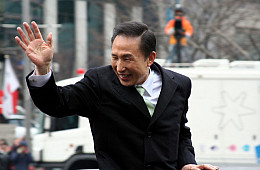Seoul Central District Court issued an arrest warrant of former president Lee Myung-bak for alleged bribery and other misconduct on March 23. Lee faces charges including graft, tax evasion, and embezzlement. But what particularly frustrated his conservative, security-conscious supporters is the allegation that he abused his power for his own interests at the sacrifice of national defense during his years in office.
In fact, such speculation has long swirled. Especially after the incumbent South Korean President Moon Jae-in embarked on a political campaign for “eradication of long-standing corruption,” evidence supporting the allegations rose to the surface. For instance, the Lee administration won an $18.6 billion bid to construct a nuclear power plant in the United Arab Emirates (UAE) in 2009, which was touted as one of Lee’s major achievements.
However, it has been argued that Lee, in exchange for winning the bid, also signed a secret military pact with the UAE. Reportedly, the pact, signed without the National Assembly’s approval and in violation of the relevant law, obligated South Korea to intervene to assist the UAE in the event of a military conflict; South Korea is obligated not only to supply military equipment, but also to dispatch its troops to protect the UAE. If true, such an agreement risks involving South Korea in serious conflicts in the Middle East. The existence of such a quasi-military alliance pact was recently confirmed by Lee’s former defense minister, further infuriating many South Koreans.
Another allegation regards clandestine linkages between Lee and corporations as well. For example, Lotte Group, a giant retail conglomerate in South Korea, had long aspired to build South Korea’s tallest skyscraper in Seoul. Yet, since the architecture would stand in the way of fighter jets approaching the Seongnam Air base, South Korea’s Air Force had been against the construction.
Previous South Korea governments, regardless of their political stance, had always taken a military’s side, frustrating Lotte’s dream for 15 years. The Lee administration, nevertheless, changed this longstanding position and authorized the skyscraper plan in 2009; instead of precluding the construction, the administration agreed to adjust the angle of a military runway. Since then, rumors about backdoor deals between Lee and the Lotte Group have mushroomed. Although an investigation is still ongoing, some of the rumors have already been substantiated with apparent government documents that have emerged. “The government should persuade [Lotte Group] to [build the skyscraper] by using logic that this may be a last chance that the government fully supports [the construction],” reads one.
South Korea persecutors also accused Lee of crippling South Korea’s intelligence capabilities. Before the 2012 presidential election, the Ministry of National Defense’s Cyber Command hired 79 military-related officers, 47 of whom were placed in the psychological warfare unit. The Command and the unit were established to confront North Korea’s notorious cyber attacks. However, it has been argued that they were used to manipulate public opinion in favor of a conservative candidate, Park Geun-hye, and to defame her liberal rival, Moon Jae-in, while President Lee directly orchestrated the secret manipulation and slander project. In addition, Lee is also charged with appropriation of $100,000 off-book funds, originally allocated to the National Intelligence Service for North Korea-related operations — a charge Lee reportedly admitted to.
Currently, Lee is adamantly denying most of the charges leveled at him. Some assert that the charges are merely a result of political retaliation by Moon, pointing out that the corruption scandal surfaced only after a new liberal government was inaugurated. Nevertheless, it seems most South Koreans do not trust Lee anymore, with around 75 percent of people supporting his arrest.
There has long been a prevailing belief among South Koreans that conservative parties, albeit corrupt, are good at protecting national security, whereas liberal parties are too dovish in tackling North Korea. However, with Lee accused of crippling national defense and Moon skillfully dealing with Pyongyang, for some that myth is quickly disappearing.
Ahn Seul Ki and Son Daekwon are Ph.D students at School of International Studies, Peking University in China.
